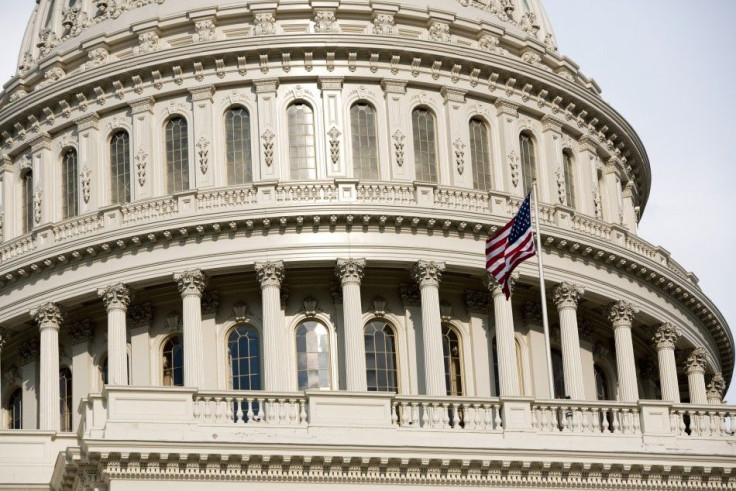Vermont Towns Vote To Overturn Citizens United, Call For Constitutional Amendment

Thousands of Vermonters raised their voices -- and their votes -- against the concept of corporate personhood Tuesday when more than 50 communities in the state passed a measure urging the U.S. Congress to begin the process of altering to the U.S. Constitution in order to clarify that corporations do not have the same rights as human beings.
State Sen. Virginia Lyons, a Chittenden County Democrat, said Wednesday that 53 communities passed the ballot measure on Tuesday, Vermont's Town Meeting Day. The event, held annually on the first Tuesday in March, is a major political event for Vermonters, who typically use the occasion to discuss the civic issues of their community, state and nation, according to the Vermont Secretary of State web site. As of Wednesday morning, Lyons said only two communities had rejected the measure.
It is a heavy lift; there's no question about it. But if we don't do this we stand to lose a great deal more, Lyons told The Associated Press. If nothing else, it moves the conversation to where something comprehensive can happen, and that is up to Congress.
Supporters are pushing for constitutional amendment that would override the U.S. Supreme Court's momentous 2010 Citizens United decision, which held that the First Amendment's free speech clause prohibits the government from restricting political expenditures by corporations, groups and unions. Critics say the decision, which paved the way for the creation of super PACs, has given corporations an unprecedented amount of power in the political arena by letting them spend unlimited sums to promote the political candidates of their choice.
Lyons and other supporters are hoping the show of support across the state will encourage Vermont's Legislature to pass a similar resolution.
Sanders Backs Amendment
Vermont's independent U.S. Sen. Bernie Sanders, a fierce opponent of the Citizens United decision, applauded the state's support of the amendment.
Unlike the U.S. Supreme Court, Town Meeting Day voters understood that corporations are not people. The resounding results will send a strong message that corporations and billionaires should not be allowed to buy candidates and elections with unlimited, undisclosed spending on political campaigns, Sanders said in a statement.
In December, Sanders introduced a federal amendment that would ban corporations from using money to influence political elections at the federal, state and local levels, clarify the fact that corporations are not living people -- and therefore have no constitutionally protected rights, and re-establish Congress' authority to limit political campaign spending by corporations, candidates, individuals and other private entities.
Occupy Wall Street-Influenced
The bill is an exact replica of a House bill introduced by U.S. Rep. Ted Deutch, D-Fla. The House bill, known as the Outlawing Corporate Cash Undermining the Public Interest in our Elections, is the first piece of federal legislation to take its name from the Occupy Wall Street movement. At least four other constitutional amendments were introduced in either the House and Senate last year with the intention to nullify all or part of the Citizens United decision.
Several other states and cities have passed similar ballot initiatives intended to elevate the issue to the national level. Communities in Massachusetts, North Carolina, Montana and Colorado have all called for resolutions to either reverse Citizens United or oppose the concept of corporate personhood. The New York City, Los Angeles and Oakland, Calif., city councils, as well as the New Mexico Legislature, have all passed resolutions calling for such an amendment.
In December, Montana's Supreme Court was the first to defy Citizens United when it ruled the decision did not apply to the state's campaign finance law. Instead, the court upheld a 1912 voter initiative -- the Corrupt Practices Act -- that declared independent expenditures to influence political campaigns by corporations unconstitutional.
Last month U.S. Supreme Court Justices Ruth Bader Ginsburg and Stephen Breyer, in reaction to the Montana decision, released a statement indicating the case in question could potentially challenge the Citizens United ruling. The court has put a temporary hold on Montana's ruling.
Several grassroots organizations have formed campaigns intended to encourage the passage of a constitutional amendment that would overturn Citizens United. The public interest-oriented group Common Cause has launched Amend 2012, a campaign that is specifically encouraging individual states and communities to pass ballot resolutions calling on Congress to pass such as an amendment, with the overarching goal of injecting enough momentum into the issue to bring it to a vote on the federal level.
The amendment would face a formidable challenge if it even managed to come to a vote in Congress. Amending the Constitution requires the support of two-thirds of both the House and Senate and then must be ratified by three-fourths of state legislatures.
The effort could potentially stall for years -- or even centuries -- once it is sent to the states for ratification. For example, the 27th Amendment, the latest to be added to the Constitution, was only ratified in 1992 after being submitted to the states for approval in 1789.
© Copyright IBTimes 2024. All rights reserved.




















